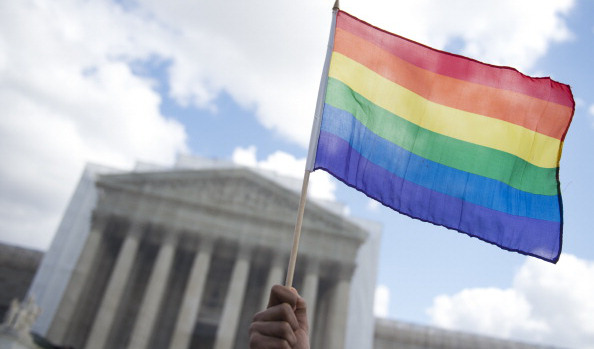>> Bay Area Businesses Among 379 Pushing Supreme Court To Declare Same-Sex Marriage Constitutional Right.
Des banques, des groupes industriels, des géants des télécoms, des sociétés de transport, des distributeurs, des sociétés de service… Au total, 379 grands groupes américains se sont mobilisés pour réclamer à la Cour Suprême des Etats-Unis qu’elle invalide les lois interdisant le mariage entre deux personnes du même sexe.
 Aetna, Alcoa, Amazon.com, American Airlines, American Express, Apple, AT & T, Barclays, BlackRock, Bristol-Myers Squibb, Capital One, Cardinal Health, Chubb, Cigna, Cisco, Colgate-Palmolive, ConAgra , Corning, Credit Suisse Securities, CVS Santé, Delta Air Lines, Deutsche Bank, Dow Chemical, eBay, Facebook, General Electric, General Mills, GlaxoSmithKline, Goldman Sachs, Google, Hartford Financial Services, Hilton, HSBC, Intuit, Johnson & Johnson , Kimberly-Clark, KPMG, Levi Strauss, Marriott, Marsh & McLennan, Massachusetts Mutual, McKinsey, Microsoft, MillerCoors, Morgan Stanley, Nationwide Mutual, les New England Patriots, New York Life, Nike, Northrop Grumman, Office Depot, Oracle, Orbitz, Pandora, Pepsi, Pfizer, Pricewaterhouse Coopers, Procter & Gamble, Prudential, Qualcomm, RBC Marchés des Capitaux, le San Francisco Giants, Staples, Symantec, les Rays de Tampa Bay, cible, la Banque TD, Twitter, UBS, United Air Lines, Verizon, Walt Disney, Wells Fargo, et Zynga…
Aetna, Alcoa, Amazon.com, American Airlines, American Express, Apple, AT & T, Barclays, BlackRock, Bristol-Myers Squibb, Capital One, Cardinal Health, Chubb, Cigna, Cisco, Colgate-Palmolive, ConAgra , Corning, Credit Suisse Securities, CVS Santé, Delta Air Lines, Deutsche Bank, Dow Chemical, eBay, Facebook, General Electric, General Mills, GlaxoSmithKline, Goldman Sachs, Google, Hartford Financial Services, Hilton, HSBC, Intuit, Johnson & Johnson , Kimberly-Clark, KPMG, Levi Strauss, Marriott, Marsh & McLennan, Massachusetts Mutual, McKinsey, Microsoft, MillerCoors, Morgan Stanley, Nationwide Mutual, les New England Patriots, New York Life, Nike, Northrop Grumman, Office Depot, Oracle, Orbitz, Pandora, Pepsi, Pfizer, Pricewaterhouse Coopers, Procter & Gamble, Prudential, Qualcomm, RBC Marchés des Capitaux, le San Francisco Giants, Staples, Symantec, les Rays de Tampa Bay, cible, la Banque TD, Twitter, UBS, United Air Lines, Verizon, Walt Disney, Wells Fargo, et Zynga…
Dans un court texte, ces grandes entreprises expliquent que les Etats interdisant les mariages gays « entravent les efforts des employeurs pour recruter et retenir la main d’œuvre » dans ces Etats. Pragmatiques, les entreprises soutiennent que la charge imposée par ces lois « discriminatoires » complique leur tâche les obligeant à traiter leurs employés de manière différente ce qui engendre « une confusion inutile, de la tension et une baisse de moral des salariés ».
Autorisé dans 36 Etats sur 50, ainsi qu’à Washington, le mariage entre personnes de même sexe reste l’un des sujets les plus controversés de la société américaine. En janvier, la Cour suprême, sollicitée depuis de nombreuses années, avait fait un pas de géant en annonçant qu’elle allait décider en 2015 si les couples de même sexe pouvaient se marier partout aux Etats-Unis, ouvrant la voie à une décision historique. Sa décision est attendue fin juin.
[spacer]
>> Bay Area businesses ranging from the San Francisco Giants to Silicon Valley firms such as Google Inc. and Facebook Inc. are among 379 companies that asked the U.S. Supreme Court Thursday to declare a constitutional right to same-sex marriage.
The companies told the court in a friend-of-the-court brief that inconsistent marriage laws nationwide create a “fractured legal landscape” that increases their administrative costs and makes it hard to attract the best workers.
“Allowing same-sex couples to marry improves employee morale and productivity, reduces uncertainty, and removes the wasteful administrative burdens imposed by the current disparity of state law treatment,” the businesses said.
The brief was filed in support of couples who challenged same-sex marriage bans in Ohio, Kentucky, Michigan and Tennessee.
The high court announced Thursday it will hear arguments in the four consolidated cases in Washington, D.C., on April 28. It is expected to issue a decision by the end of June.
The Supreme Court is reviewing a ruling in which a panel of the 6th U.S. Circuit Court of Appeals in Cincinnati upheld the four state laws by a 2-1 vote last year.
The appeals court majority said the U.S. Constitution does not provide a right to same-sex marriage and that the issue is best left to individual states to work out “through the customary political processes.”
That ruling created a conflict that only the U.S. Supreme Court can resolve. Four other regional federal appeals courts, including the 9th U.S. Circuit Court of Appeals in San Francisco, reached the opposite conclusion, finding that there is a constitutional right to gay marriage.
A friend of the court, also known as an amicus curiae, is an individual or group that is not an official party to a case, but has an interest in the outcome and wishes to file a brief expressing its views.
Giants President Larry Baer said in a statement, “San Francisco is the epicenter of the marriage equality movement and it is only fitting that its professional sports team would join in this effort.
“The San Francisco Giants are proud to sign the brief because it speaks directly to our core values of equality and social justice for all,” Baer said.
In addition to the baseball team, Mountain View-based Google and Menlo Park-based Facebook, Bay Area businesses and groups signing on to the brief include the San Francisco Chamber of Commerce, Apple Inc. of Cupertino and Hewlett-Packard Co. of Palo Alto.
Others are Wells Fargo Bank and Twitter Inc. of San Francisco, Cisco Systems Inc. and eBay Inc. of San Jose, Oracle America Inc. and Electronic Arts Inc. of Redwood City and Intel Corp. of Santa Clara.
Approximately 36 states, including California, currently allow same-sex marriage. The brief notes that about 70 percent of the American population lives in these states.
The businesses argue that the marriage bans in the remaining states require them to administer complicated benefits schemes giving workers differential treatment that “breeds unnecessary confusion, tension and diminished employee morale.”
The brief cites a study that estimates that inconsistent marriage laws impose a $1.3 billion annual cost on American businesses.
The Supreme Court announced in January that it will hear the four cases, but did not set the date for arguments until Thursday.
The court said it will consider two issues. The first is whether the U.S. Constitution’s 14th Amendment, which guarantees due process and equal protection of the laws, requires states to license same-sex marriages.
The second is whether the amendment requires states to recognize same-sex marriages that were legally performed in another state.
avec lesechos.fr

















